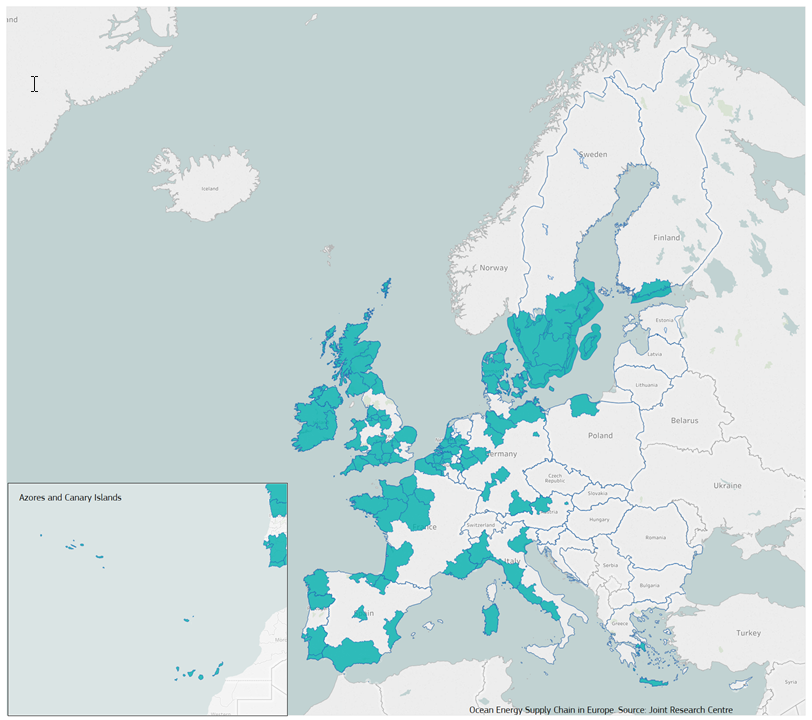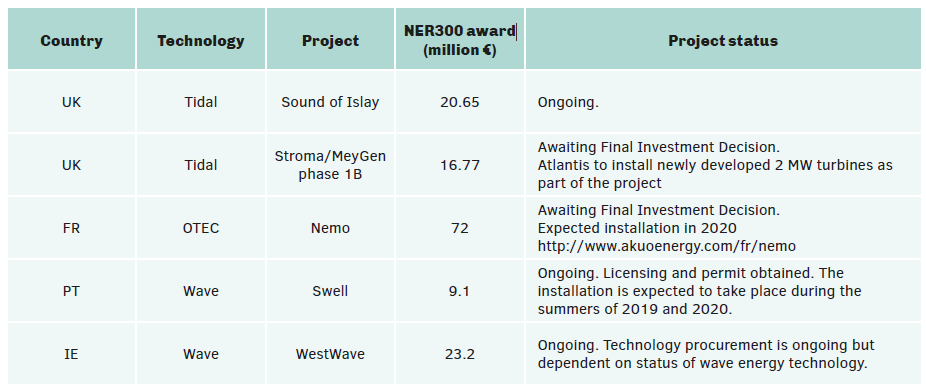Country Reports
EUROPEAN COMMISSION
Davide Magagna, Matthijs Soede
DG JRC & DG RTD
SUPPORTING POLICIES FOR OCEAN ENERGY
The European Commission is supporting the development of the ocean energy sector through an array of activities based on two major policy initiatives: the Energy Union and the SET-Plan in particular, and the Blue Growth Strategy. The main aim of these activities is to drive the development of ocean energy within the transformation of the European energy system and to exploit its potential to create growth and jobs in the EU.
The new European Commission President Ursula von der Leyen said that she wants Europe becoming the world’s first climate-neutral continent by 2050. To achieve this, the European Commission presented the European Green Deal . Part of the European Green Deal will be a marine renewable energy strategy which will be presented in 2020.
New support programmes (Horizon Europe and Innovation Fund) and regulations will be developed.
The actions address technological, financial and environmental barriers that are hindering the development and deployment of ocean energy technologies and as a consequence their cost-reduction:
Technical actions:
- Tidal energy – assist technology development and knowledge building up to TRL6
- Tidal energy – support system demonstration in operational environment and knowledge building in the TRL 7-9 categories.
- Wave energy – support technology development, system demonstration and knowledge building up to TRL 6
- Wave Energy – encourage and support device and system demonstration at early demonstration array scale up to TRL 7-9.
- Collaborate in the areas of installation, logistics and infrastructure.
- Co-ordinate the development of standards and guidelines for wave technology evaluation and LCoE analysis.
Financial Actions:
- Investigate the potential for creation of an Investment Support Fund for ocean energy farms: EU and National Authorities should collaborate in order to create a Fund providing flexible capital, and enabling further private capital to be leveraged
- Progress the creation of an EU Insurance and Guarantee Fund to underwrite various project risks: This would be targeted at the first ocean energy projects to cover risks such as availability, performance, unforeseen events, failures, etc. Consider the provision of a common reserve fund available to multiple projects in the initial farm or plant roll-out, to spread the risk and reduce the cost of providing guarantees.
- Support the development of a collaborative procurement model adaptation of the "Wave Energy Scotland" approach for wave energy development at EU Level using pre-commercial procurement or similar.
Environmental Actions:
- Collaboration on the development of certification and safety standards for the development, testing, deployment of ocean energy devices,
- Continue the de-risking of environmental consenting through an integrated programme of measures and in particular through promoting open data sharing.
An estimated overall investment of EUR 1.2 billion is required to ensure the success of the implementation plan, taking into account contribution from industry, national and European funds :
- EUR 409.5 million coming from the industry (private funds - 33% of the total);
- EUR 421.5 million coming from national/regional programmes - (34% of the total);
- EUR 411.5 million coming from EU funds (33% of the total – mainly from Horizon 2020 and a minor part form InnovFin EDP)”
As mentioned in the European Commission Blue Growth Strategy, ocean energy can play a threefold role in the EU, helping meeting decarbonisation targets, fostering growth in European regions and becoming a driver for employment. The contribution of Ocean Energy to the blue economy was accounted in the European Commission first "Annual Report on the Blue Economy " published in July 2018. The report examines the role of emerging sectors, including ocean energy, and the opportunity that they bring for attracting investments and potential future deployments. The analysis showed that in the EU between 2007 and 2015 cumulative investments for EUR 2.6 billion has been directed towards the ocean energy sector, with 74% of the funds coming for private corporate investments (1.9 EUR billion), with the supply chain located in many EU regions, including landlocked countries. The European Commission, in the period 2007-2018, has supported a variety of ocean energy projects for a total investment of EUR 864 million, through different instruments such as R&D framework programmes (FP6, FP7 and Horizon 2020), European regional development funds (ERDF), and demonstration support with the NER 300 and the InnovFin Energy Demo Projects (EDP).
 |
The "Clean Energy for EU Islands " is a new policy initiative, launched in 2017, with the aim of helping islands to generate their own sustainable, low-cost energy through the use of the latest renewable energy technologies. Whilst not specific to ocean energy, the initiative offers scope for the investigation of the use of ocean energy technologies in EU islands, especially when coupled with energy storage facilities. In Europe a significant part of the installed ocean energy devices is located in the proximities of islands suchs as Orkney (UK), Shetlands (UK), Ussant (FR), Crete (GR), Gran Canaria (ES) and Texel (NL).
In 2018 two environmental projects amounting EUR 1.5 million funded by DG MARE/EASME (Executive Agency for Small and Medium-sized Enterprises) started: SEAWAVE led by EMEC and WESE led by Azti Tecnalia. The projects will run for three years and provide information on the interaction between wave energy converters deployed at EMEC and BIMEP with the marine environment with the aim of reducing uncertainties related to licensing and consenting of wave energy farms.
MARKET INCENTIVES
The NER300 programme remains the main market incentive scheme supporting first-of-a-kind commercial-scale renewable energy projects. Five ocean energy projects were awarded support through NER300 in 2013 and 2014. No new projects were announced in 2019. Table 1 presents an overview of the project announced and their status.
 Table 1 Pre-commercial projects awarded support through NER300 Table 1 Pre-commercial projects awarded support through NER300 |
PUBLIC FINANCE PROGRAMMES
The European Investment Bank (EIB) together with the European Commission has launched the InnovFin Energy Demo Projects (EDP) which provides support in the form of loans for first-of-a kind projects. InnovFin aims to facilitate and accelerate access to finance for innovative businesses and projects in unproven markets in Europe. The scheme helps reducing the financial risk of demonstration projects, offering equity and debts tailored to the need of the project.
 Table 2 Projects supported by EIB InnovFin Energy Demo Table 2 Projects supported by EIB InnovFin Energy Demo |
FINANCE PROGRAMMES
In 2018 the European Commission has presented their proposals for their funding programmes for 2021-2027. Horizon Europe will be the successor of Horizon 2020 and the initial budget proposal for Research and Innovation is EUR 100 billion. The European Commission has proposed an EU Innovation Fund for the period 2021-2027, which will build on the NER300 programme. The Innovation Fund has been established by the revised EU Directive to enhance cost-effective emission reductions and low-carbon investments. The fund will support low-carbon innovation in energy intensive industry, carbon capture and utilisation (CCU) technologies, innovative renewable energy and energy storage technologies, and demonstration projects on the environmentally safe capture and geological storage of CO2 (CCS).
---



